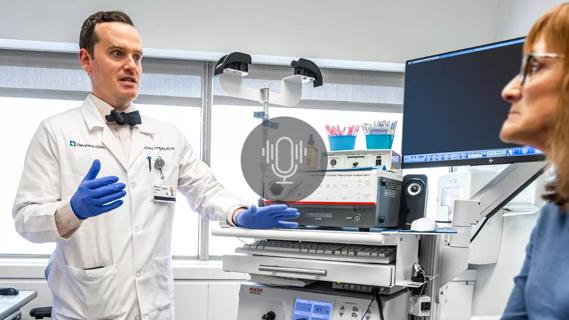Diagnosing the cause of a chronic cough can be challenging and timely, but multidisciplinary collaboration and the development of new treatments are improving the process

For patients with chronic cough — a cough that has been present for more than eight weeks — finding an answer to the simple question of ‘why am I coughing,’ can be a frustrating challenge. Often times the journey involves bouncing from several different specialists trying to pinpoint a cause. Chronic cough can be related to several different conditions, so a multidisciplinary approach to diagnosis and treatment as well as strong communication between specialists is critical. At Cleveland Clinic, specialists work closely across the entire care path to accurately diagnose the cause of a patient’s chronic cough.
Advertisement
Cleveland Clinic is a non-profit academic medical center. Advertising on our site helps support our mission. We do not endorse non-Cleveland Clinic products or services. Policy
“Determining the cause is the biggest challenge with chronic cough because there are so many conditions that could cause chronic coughing,” explains Michael Ghobrial, MD, a pulmonologist and Director of the Chronic Cough Program. “For example, a patient could be experiencing chronic cough because of bronchial asthma, or maybe the cough is caused by the undiagnosed gastroesophageal reflux disease (GERD) or maybe it’s secondary to post nasal drip (PND). There are also other causes of chronic cough related to chronic interstitial lung diseases, chronic bronchitis, nonasthmatic eosinophilic bronchitis, allergic reactions, etc. Less common, is cough related to chronic upper airway hypersensitivity syndrome, often referred to as sensory neuropathic cough (SNC). While determining the cause of chronic cough is often challenging for caregivers, it’s also frustrating for patients and their families because the diagnosis process is often lengthy.”
In addition to the challenges of diagnosis and treatment, the chronic cough itself has a significant impact on a patient’s daily life…and on the daily lives of others.
“Recently, a patient with a chronic cough lasting over 20 years and his wife came in for a consultation,” recounts Dr. Ghobrial. “When I asked him to tell me more about his cough, his wife interrupted and said, ‘no, it’s not his cough; it’s our cough.’ Chronic cough is not just something that only affects the patient, but it has many indirect effects on the patient’s family and friends too. This has become even more evident with the COVID-19 pandemic and patients who experience chronic cough as a result of long-COVID.”
Advertisement
Besides being a disturbance, chronic cough can impact body systems in addition to the obvious pulmonary impact. During a cough, the intra-abdominal pressure increases, and some patients can develop urine incontinence, urethral, rectal, and/or vaginal prolapse. Some patients have suffered recurrent hernias that fail surgical management because of chronic cough. These patients were referred for evaluation and management by their surgeons prior to considering another surgery.
“While interference with daily living is the most common complaint I hear from patients with chronic cough, it’s important to remember that chronic cough has some very disabling symptoms and can lead to significant risks,” says Dr. Ghobrial.
Most patients who come to see Dr. Ghobrial are being referred by other pulmonologists, primary care physicians or other specialists. He explains that the first step when consulting a new patient is to obtain a comprehensive history about their health, onset of cough and its pattern. It’s imperative to review all the work-up that was completed with other physicians before patients came to see us at the Cleveland Clinic Chronic Cough Clinic. Evaluation often includes performing pulmonary function tests to uncover conditions like asthma or chronic obstructive pulmonary disease and a simple chest X-ray to look for any gross structural changes in the chest.
Additional testing could be obtained after the initial evaluation to help answer additional questions that often include blood work, more detailed imaging studies like a CT scan of the chest, and possible Bronchoscopy. Depending on the patients’ history, we might want to follow this with a GI workup including pH monitoring, upper endoscopy and BRAVO study. Patients usually will have a consultation with Allergy medicine, with possible allergy testing, an ear, nose and throat exam with possible referral for speech evaluation for upper airway and vocal cord evaluation with flexible laryngoscope.
Advertisement
Even before performing any testing, Dr. Ghobrial notes that depending on what the patient’s history and physical exam indicate, he might talk to patients about empiric treatments for acid reflux, chronic rhinitis and postnasal drip before embarking on any advanced testing and see how they respond.
For certain patients who have sensory neuropathic cough, which is a disorder of the cough reflex and who lack any other etiologies, neuromodulators may be an option. This type of therapy helps suppress or readjust the dysregulated cough reflex. Sometimes patients are referred for superior laryngeal nerve block to help control this type of cough when it is refractory to all medical therapy.
Dr. Ghobrial explains, “Our otolaryngology colleagues can perform these injections to help calm down the cough reflex. Ultimately, though, Dr. Ghobrial notes that it’s important to remember that coughing by itself isn’t a disease — coughing is a normal reflex, and the body coughs for a reason. It’s when it becomes dysregulated that it’s a problem. “This is the problem that we need to work on, and it’s through multidisciplinary collaboration, research and individualized patient care and treatment that we can solve this often frustrating condition,” he says.
There have not been any new medications approved in the U.S. for the treatment of chronic cough since the approval of Benzonatate in 1958. But new breakthrough therapies are in the final stages of development for the treatment of chronic cough. These include P2X3 receptor Antagonists (Gefapixant and Camlipixant), Voltage-gated sodium channel VGSC Antagonist (NTX-1175), Transient Receptor Potential Melastatin 8 TRPM8 Agonist (AX-8). “We expect these medications to improve the quality of life for patients with refractory and unexplained chronic cough. Not only do they seem to be very effective in treating the dysregulated cough reflex, but they also seem to be safe and well tolerated.”
Advertisement
The Chronic Cough Clinic at Cleveland Clinic has been enrolling patients for several trials of some of these medications and will provide access to these medications as soon as FDA approval is fully granted.
Advertisement
Advertisement

Exploring the impact of chronic cough from daily life to innovative medical solutions

Specialists are increasingly relying on otolaryngologists for evaluation and treatment of the complex condition

Bilateral superior laryngeal nerve block offers new treatment option for patients

Potentially cost-effective addition to standard GERD management in post-transplant patients

Multidisciplinary focus on an often underdiagnosed and ineffectively treated pulmonary disease

Pearls to reduce the strain of RSV, COVID-19 and influenza infections

No effect on symptom severity or disability, and low prevalence of long COVID

Dynamic modeling improves the accuracy of outcome predictions for ICU patients